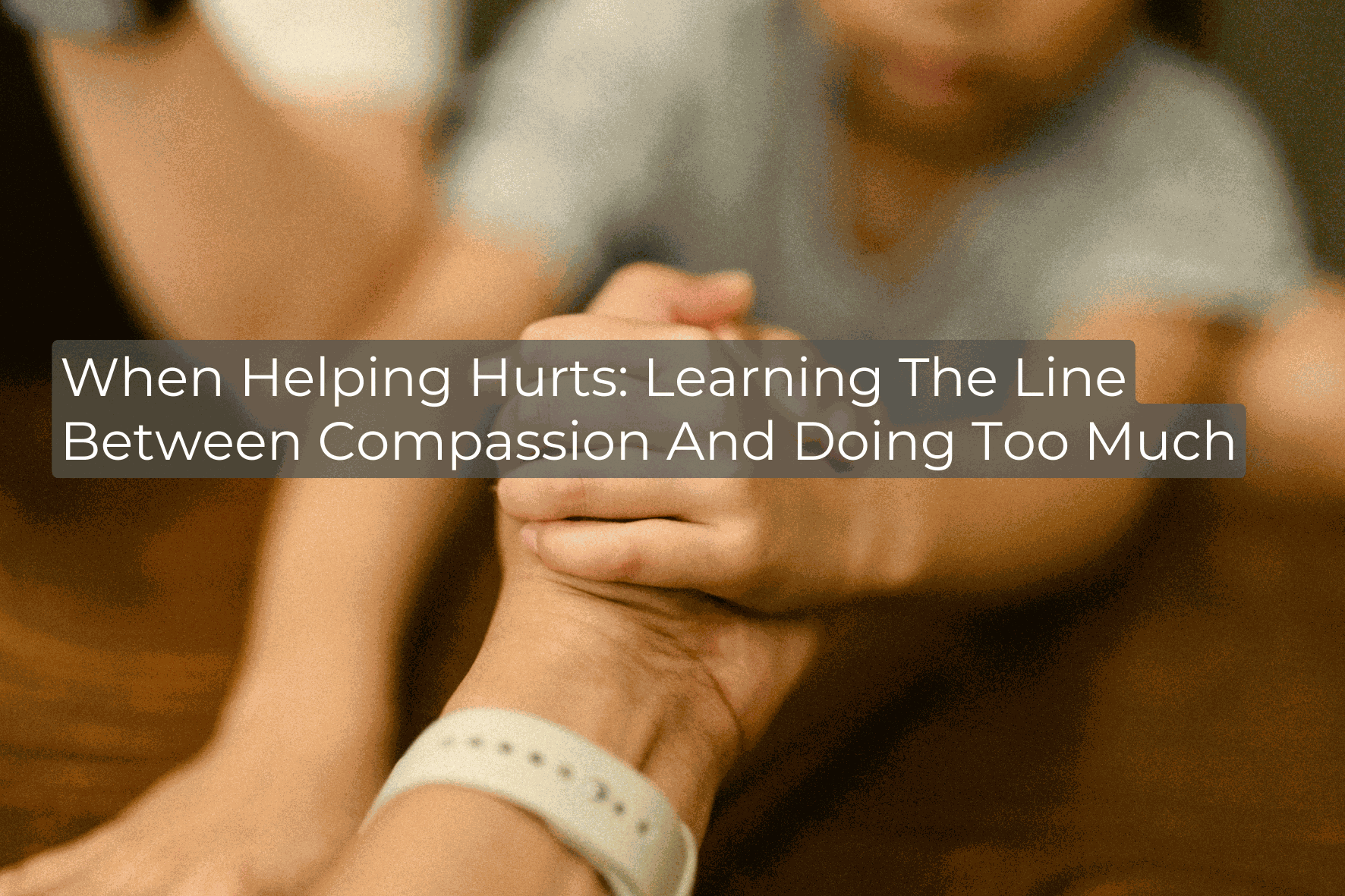When Helping Hurts: Learning the Line Between Compassion and Doing Too Much

We all want to be there for others; to be kind, to show up, to be the one people can count on.
But sometimes, without realising, we can start taking on more than we should. We step in when maybe we shouldn’t. We make excuses, cover up mistakes, or keep giving, even when we’re running low on energy. This is what we call doing too much.
This kind of over-helping can actually hold people back instead of helping them move forward.
So, what does it really mean to “do too much” for someone? And how can we tell when our support is crossing the line?
The Difference Between Being Supportive and Doing Too Much
The line between being supportive and doing too much can be blurry. Being supportive means walking alongside someone, offering encouragement and guidance to help them grow stronger. Doing too much, on the other hand, is like trying to carry them, even when those moments might be exactly what they need to learn and grow. It’s help that unintentionally keeps them stuck.
Are you in a situation but unsure which side you’re on? Ask yourself these questions:
“If I step back, will this person still be able to cope?”
“Am I helping them find solutions, or am I solving everything for them?”
“Is this support making them stronger, or more dependent on me?”
These dynamics often show up in our lives in very specific ways. Here are some common real-life dynamics where ‘doing too much’ can appear:
Misguided parenting – A parent repeatedly helps their adult child out of financial trouble, such as paying their rent or credit card bills, even though the child makes no effort to change spending habits or find work.
Unhealthy relationships – One partner constantly fixes the other’s messes or excuses harmful behaviour, hoping love will change them.
Substance abuse – Friends or family members cover for someone’s drinking or drug use, lying to protect their reputation or stepping in to handle responsibilities they’ve neglected.
Employer dynamics – A manager constantly works overtime to cover for a chronically underperforming employee instead of addressing the performance issue.
Financial dependence – Always lending money to that friend who never repays and takes no steps to prevent future crises.
Poor boundaries – Always being “on call” for someone who expects immediate help, even at the cost of your rest, health, or commitments.
In all of these situations, the intention often stems from love, loyalty, or duty, but the impact can enable harmful cycles.
Why We Do It and What It Costs Us
Many of us struggle to say no because we want to be seen as caring, dependable, or good people. We fear disappointing others or being rejected. Sometimes, we confuse helping with fixing, thinking it’s our job to solve someone’s problems.
But constantly doing more than what’s healthy can cause real harm. It drains our energy, blurs boundaries, and may create unhealthy dependence. The person receiving help might lose confidence in their ability to cope, and the cycle continues.
Buddhist teachings link the impulse of doing too much to attachment—not just to people or outcomes, but to our very identity. We may attach to the idea of being a ‘good person who always helps,’ holding tightly to that story even when it is hurting us. But the Dharma teaches that true compassion is not about rescuing others at any cost. It means recognising suffering and responding with both heart and wisdom. It’s allowing others to face their challenges and learn from them, as they should naturally.
Without well-defined boundaries, we risk resentment, burnout, and damaged relationships. The intended kindness can become a burden—for both sides.
As Pema Chödrön beautifully said, “Compassion is not a relationship between the healer and the wounded. It’s a relationship between equals.”
Recognising When You’re Giving Too Much
It can be challenging to tell when your helpfulness has crossed the line into overextending yourself, and it’s easy to confuse genuine care with an unhealthy level of responsibility for others. Recognising the signs is the first step toward finding a healthier balance. Here are some signs that you might be taking on too much.
You feel emotionally exhausted. Instead of feeling good about helping, you're left feeling drained, anxious, or overwhelmed.
You're making excuses for others. You find yourself justifying someone's harmful behaviour or poor choices to yourself or others.
You feel responsible for fixing things. You believe it's your job to solve someone else's problems or manage their emotions.
You avoid saying "no." You frequently agree to things you don't want to do, or you avoid difficult conversations, all to "keep the peace."
You feel frustrated and guilty at the same time. You're resentful of the situation but also feel guilty for feeling that way.
If these feelings resonate with you, it might be a signal to pause and reflect. True compassion doesn’t call for you to sacrifice your well-being. It may be time to set clearer boundaries to protect your energy and emotional health.

